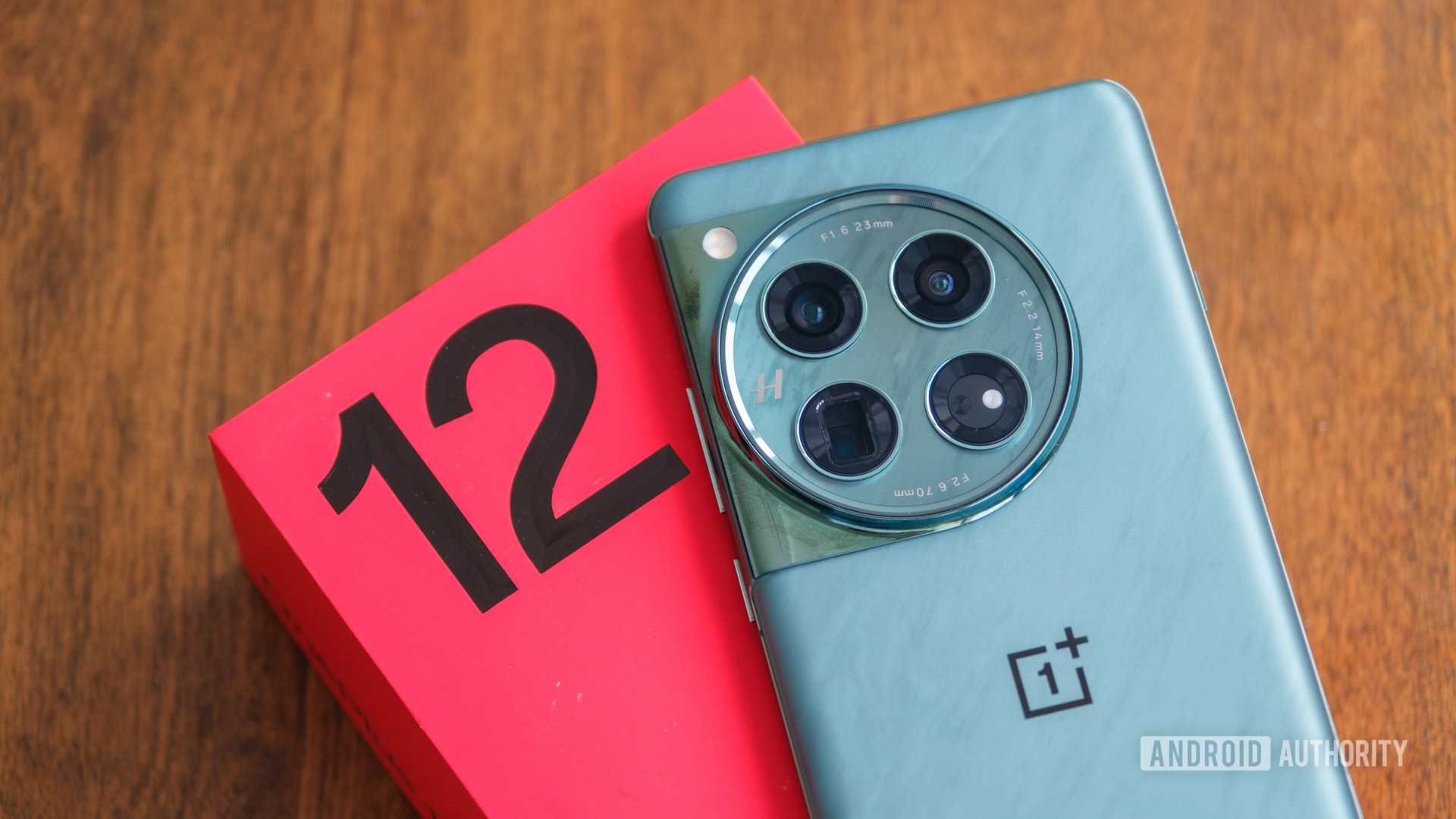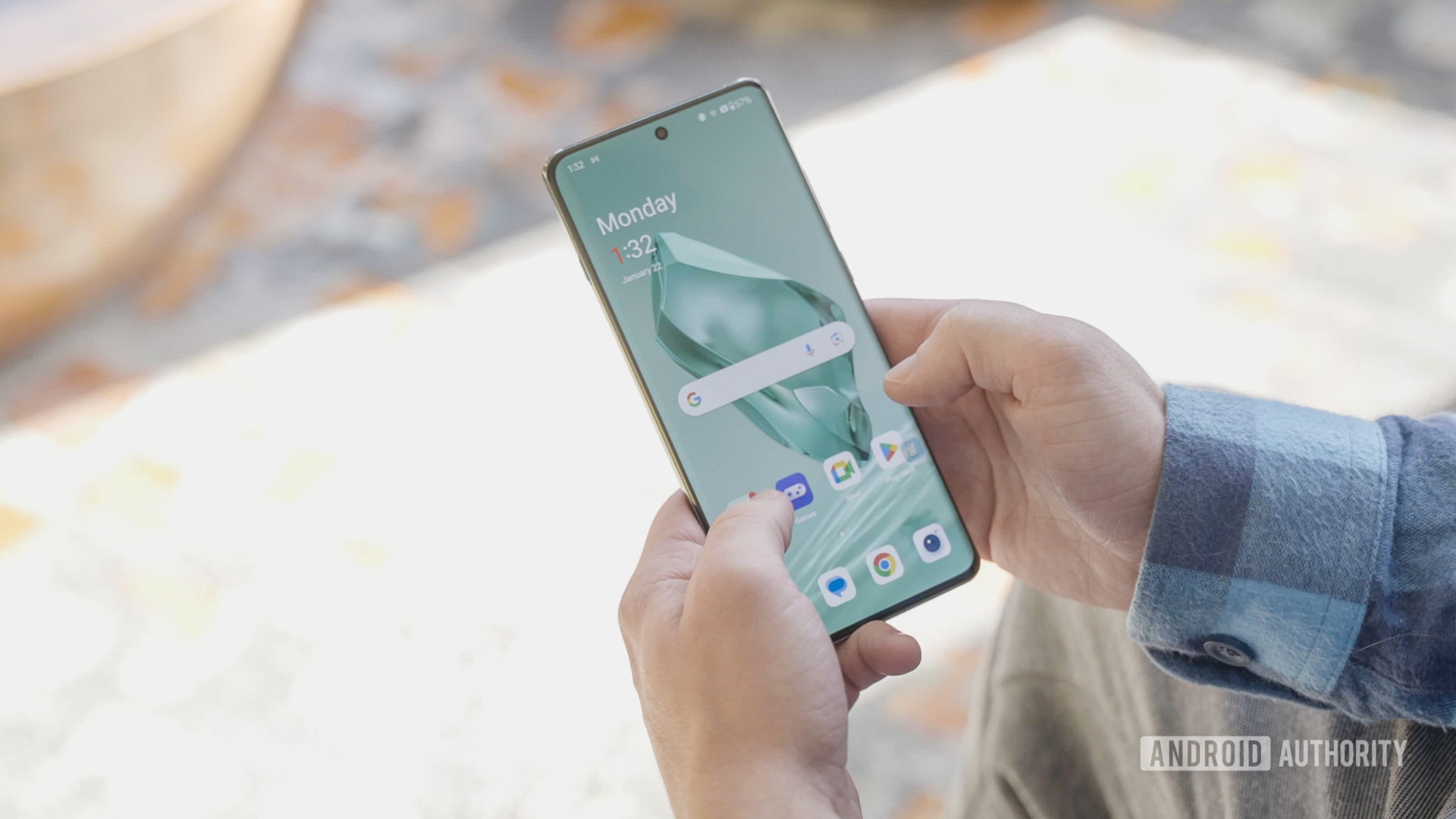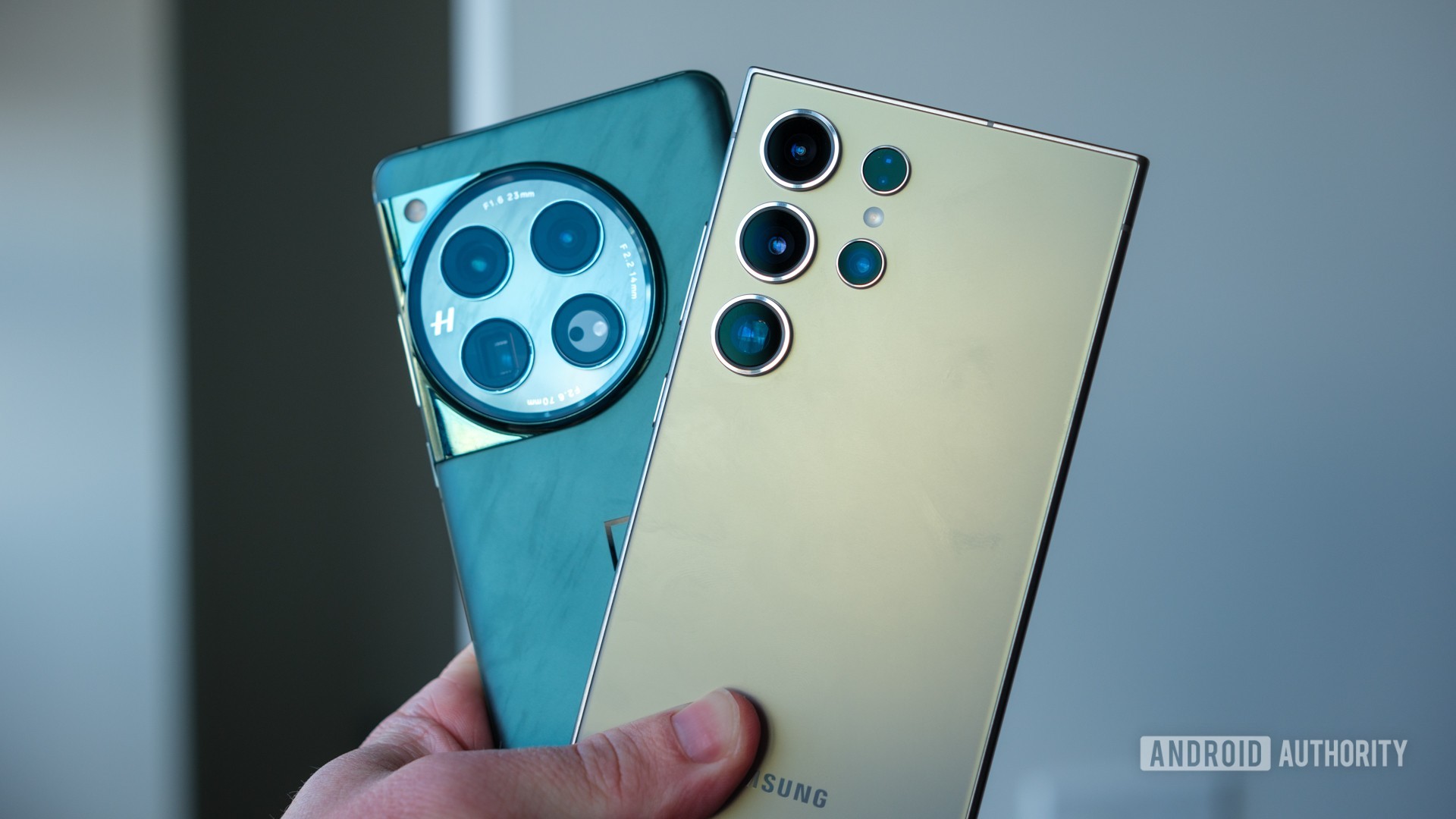Affiliate links on Android Authority may earn us a commission. Learn more.


OnePlus 12 review: Should you buy it?
Published onAugust 25, 2024

OnePlus 12
MSRP: $799.00
What we like
What we don't like

OnePlus 12
OnePlus 12 review: At a glance
- What is it? The OnePlus 12 is the latest traditional flagship from OnePlus, succeeding the OnePlus 11 with a similar design and powerful Hasselblad-tuned camera array. It also packs a Snapdragon 8 Gen 3 chipset and a massive 5,400mAh battery that's finally backed by both 80W wired charging in the US (or 100W globally) and 50W wireless charging.
- What is the price? The OnePlus 12 with 12GB of RAM and 256GB of storage kicks off at $799, or you can upgrade to 16GB of RAM and 512GB of storage for $899.
- Where can you buy it? The OnePlus 12 launched for pre-orders on January 23, 2024, before reaching open sales from OnePlus, Amazon, and Best Buy on February 6. It's not available through carriers like AT&T, T-Mobile, or Verizon, though it does support all three networks.
- How did we test it? I tested the OnePlus 12 for a period of three weeks, and the unit was supplied by OnePlus for the purpose of this review.
- Is it worth it? The OnePlus 12 feels like a OnePlus 11 that's evolved into its final form, which is great news for fans of the flagship killer. It takes everything that the previous model got right, adds a bigger battery, brings back wireless charging, and upgrades the Hasselblad-tuned cameras for good measure. OnePlus still needs to bump up its software commitment, and it's yet to embrace the AI revolution, but its latest flagship checks every other box.
Should you buy the OnePlus 12?

To reinvent or to refine, that is the question. At least, that’s the question if you’re an Android OEM gearing up to challenge the best phones on the market. In this case, OnePlus chose to refine, introducing a OnePlus 12 that looks and feels quite a lot like the previous OnePlus 11. However, its refinements come in just the right places, righting several of the OnePlus 11’s wrongs and pushing some of its better specs just a bit further.
The first change you’ll notice — or rather won’t notice — is the OnePlus 12’s updated design. There’s no question as to the phone’s lineage, sporting an almost identical circular camera bump to its predecessor, familiar green and black finishes, and a massive curved display that inches closer and closer to the 7-inch mark. More specifically, the OnePlus 12 now sports a 6.82-inch panel of curved Gorilla Glass Victus 2 with a variable 120Hz refresh rate that can drop to 1Hz as needed and a blinding 4,500 nits of peak brightness. You’ll almost never reach said peak outside of using ProXDR processing in bright sunlight, but it’s still an impressive mark.
It may not look much different, but the OnePlus 12 takes the best parts of the OnePlus 11 and pushes them even further.
As for the rest of the OnePlus 12’s premium build, well, everything is where you’d expect. The power button and volume rocker sit on the right side — much closer together this time, small-handed folks rejoice — while the alert slider sits on the edge of the camera bump. The Silky Black and Flowy Emerald (black and green) finishes come with color-matched glossy frames, which pick up fingerprints but offset the matte glass nicely. We received the Flowy Emerald version, which adds a bit of a marbled texture to OnePlus’ usually shiny green glass.
Unfortunately, we have to knock the OnePlus 12 for skipping a full IP68 rating. Instead, it offers IP65 protection, which means it’s safe from jets of water from all sides. There’s a chance that this is another case of OnePlus deciding not to pay for the extra certification, but when you’re spending $800 on a smartphone, I’m not going to take the chance. I took the phone out for a few runs in the rain and snow but rarely felt confident pulling it out to grab camera samples in adverse conditions.
Despite its relatively minor changes, the OnePlus 12 feels much better in the hand than its predecessor ever did. The slight texture of the rear glass keeps it from slip-sliding out of your hands, while the camera bump itself offers a comfortable grip when gaming in landscape orientation. Mentioning gaming, I think it’s the OnePlus 12’s secret power. It simply shines in just about any title you pick up, thanks to a massive dual vapor chamber design and graphics performance that leaves very little to chance. The cooling setup, which OnePlus ostentatiously calls Dual Cryo-velocity, essentially pairs a smaller vapor chamber that pulls heat away from key components like the chipset with a much larger chamber that actually tackles the hard work of cooling the phone. It results in a surprisingly cool customer, with the OnePlus 12 only warming slightly around the camera bump after nearly an hour of bouncing between titles like Railbound and Warhammer 40,000 Tacticus.
The OnePlus 12 works well outside of the gaming realm, too. Its combination of Qualcomm’s Snapdragon 8 Gen 3 processor with up to 16GB of RAM offers more than enough power to breeze through a full day of use. During my testing, it handily managed a split between doom-scrolling on Instagram, responding to emails ahead of MWC, and using Google Maps to navigate the ever-evolving construction in downtown Baltimore. I never once felt like I had to quit some apps to free up memory for others, nor did the OnePlus 12 warm up under daily loads like streaming or navigating.
However, some of the OnePlus 12’s benchmarking scores might try to convince you otherwise — especially its CPU performance. Surprisingly, the OnePlus 12 handed in a single-core Geekbench 6 score nearly 33% lower than that of the previous OnePlus 11, then turned around and delivered a multi-core score 12% higher than the older chipset. The OnePlus 12 is also dwarfed by the Galaxy S24 series and the iPhone 15 series in both metrics, though it easily set the pace in a graphically intensive 3DMark gauntlet of stress tests. Interestingly, this isn’t the first time we’ve seen a OnePlus device (or an OPPO device, for that matter) put up modest benchmarking scores only to blitz through day-to-day tasks.
We also put the OnePlus 12 through the same set of paces in its overclocked Performance Mode to see if the battery sacrifice is worth the power reward. The switch made a massive difference in the OnePlus 12’s Geekbench 6 score — both single and multi-core — bringing it right in line with the Samsung devices it previously struggled against and within striking distance of the iPhone 15. However, Performance Mode had almost no impact on the OnePlus 12’s graphics performance peak, picking up a fraction of a percentage point in each of the 3DMark tests. It did provide better sustained performance, however, raising the average score across our stress tests. Granted, that bump came with a related increase in temperature, so you’ll want to be careful how much you put the OnePlus 12 through in Performance Mode. Personally, I’d say it’s probably not worthwhile for most users, given the OnePlus 12’s already good performance outside of the benchmarking arena.
Although the OnePlus 12’s circular camera bump looks quite a lot like its predecessor, it actually has one key change to bring up — more megapixels. Like Samsung, OnePlus decided to give its telephoto shooter a major bump in resolution, jumping from 32MP to 64MP and shifting from 2x optical zoom to 3x. The new periscope telephoto sensor drops to a slightly narrower f/2.6 aperture, though the sensor itself is larger, meaning it can capture more light. OnePlus also swapped its primary sensor, adopting Sony’s stacked LYT-808 in hopes that it will keep the OnePlus 12 among the best camera phones. It stayed at an even 50MP, but the deeper photo sites mean that the OnePlus 12 can capture more light and a shallower depth of field at its f/1.6 aperture without needing a larger sensor. Around the front, the punch hole selfie shooter now sits centrally on the 6.82-inch display, and it, too, picked up a few extra megapixels. OnePlus swapped from a 16MP sensor to a 32MP one with smaller individual pixels that bin down to 8MP images by default.
The continued partnership with Hasselblad seems to be paying off for OnePlus, with all four cameras using an updated HDR algorithm to segment images and locate subjects. It still features a portrait mode that’s tuned against Hasselblad’s premium prime lenses at 1x, 2x, and 3x zoom, and the manual controls now reside under what OnePlus calls Master Mode. I’ve been pleased with most images from the OnePlus 12 so far, with solid details and much-improved color science from previous generations. I’ll pull out some specific examples below to talk through some issues I found with the OnePlus 12’s camera suite, but be sure to check out our full-res gallery, featuring shots taken by myself and some colleagues who also tested the OnePlus 12, in this Google Drive folder to get a feel for the phone’s overall photography chops.
Zoom is typically an area where more affordable flagship phones fall down, and while I don’t have any issues with the 10x or 20x samples below, the 30x shot has some noticeable chromatic aberration around the edges of the ship and even up the side of the building. The 60x and 120x images suffer the same fate, with chromatic aberration galore and the loss of detail to the point where low-poly Lara Croft would be right at home. Sure, you can still see the large shapes of the ship, but you wouldn’t use either shot for social media or anything else — not that any camera phone really does well once you start hitting triple digits.
The OnePlus 12 fares far better for everyday snaps. You can see plenty of detail in the images below, especially in the pathway of cobblestones at golden hour. I also like the shot of the tall grasses in front of the row of houses, though it’s tricky to find which stalks are in focus at first. Rather than pick out the first row, the OnePlus 12 seems to have grabbed the second and softened both the foreground grasses and parts of the buildings in the background. I probably would have preferred a wider focal plane to get all of the grasses in focus, but I’m still pleased with the color profile, which nicely matches the evening conditions.
The next shot, taken facing toward the dock, however, is extremely soft once you zoom in even a little bit. Individual tree branches look a bit too smooth, and the light poles seem to be missing textures in favor of sharper edges (especially the one to the right). This, unfortunately, seems to be a common thread with the OnePlus 12 — it’s not so good when the lights get low.
Though this isn’t a true night-mode photo, and I’ll admit that I struggled to capture any worth saving, it illustrates where the OnePlus 12 comes up short. The phone is a bit too quick to trade fine details for brightness, trading its high-resolution sensors for low-light photos that often look overexposed. It’s a similar effect to what I saw on the OnePlus Open, where I had to drop the exposure almost as low as it would go in order to get a usable image. Despite the struggle with details, I can’t argue with the colors in the image, as nothing feels particularly oversaturated, and you can still easily identify the different browns in the boardwalk, the grasses, and the trees.
Oxygen OS has gone through a few different phases in recent years, swinging from nice and light to Color OS-lite, but now it seems to be back in a good place, with its own identity while retaining some stylistic tweaks from parent company OPPO. OnePlus’ Android 14 skin doesn’t feel massively different from its Android 13 version, and I continue to enjoy having the ability to turn off the OnePlus Shelf — an extra dropdown menu that I rarely ever intend to open. OnePlus has also extended the software policy for its latest flagship, tacking on an extra year of Android and security coverage to bring the OnePlus 12 to four and five years, respectively. It’s an improvement, sure, but it’s behind both Google and Samsung with their seven years of support. So far, our OnePlus 12 has received up to its July 2024 security patch, but we’ll have to wait and see how quickly Android 15 arrives once it’s released.
Unlike Google and Samsung, OnePlus doesn’t seem interested in jumping on the AI train, at least not in the US. Right now, the OnePlus 12 doesn’t offer access to photo editing features like Magic Editor or Photo Assist, nor does it pack search options like Circle to Search. Some AI features seem to be trickling out in China on the Color OS version, but we’ll have to wait and see if they come to OnePlus’ skin stateside.
Unlike Google and Samsung, OnePlus doesn't seem interested in jumping on the AI train... yet.
Perhaps the most impactful upgrade to hit the OnePlus 12 centers around its battery and charging setup. OnePlus boasted about the potential for a true two-day battery, and the 5,400mAh cell largely delivers. That’s right, a full 400mAh over both the Galaxy S24 Ultra and Pixel 9 Pro. I was regularly able to push the OnePlus 12 pretty close to its 48-hour claim, which I’m pretty happy with. I leaned heavily on the phone for gaming thanks to its graphics prowess but had no trouble rolling through social media or long Spotify playlists, either. It wasn’t the clear winner when put under artificial stress in our battery test suite, however, with the Galaxy S24 Ultra still dominating in most categories, with the stark exception being general camera use and Zoom call minutes — if you want a phone for lengthy video calls, this is a good bet!
Upon draining the battery, you face a long-awaited choice between wired and wireless charging. On top of its 80W wired speeds, OnePlus finally brought back 50W AirVOOC charging as an option. Both speeds are impressive, with the former filling the massive battery in less than half an hour. Of course, you’ll need a SuperVOOC or AirVOOC charger to hit the top speeds, but OnePlus still includes a charger in the box.


What are the best OnePlus 12 alternatives?

If you decide that the OnePlus 12 isn’t for you, the Android world is your oyster. There are plenty of other options worth considering, including the best from Google and the very latest from Samsung. Here are just a few options:
- Google Pixel 9 Pro ($999 at Amazon): If you’re interested in the OnePlus 12’s powerful cameras but wish it had more AI-powered features, the Pixel 9 Pro might be for you. Google’s top-tier flagship offers an update commitment that OnePlus doesn’t match, as well as the lightest Android skin you’ll find in 2024. It’s slightly smaller than the OnePlus 12 and doesn’t charge nearly as quickly, but it’s worth a look for features like the Pixel Studio and Magic Editor.
- Apple iPhone 15 Pro ($999 at Amazon): Looking outside of the OnePlus 12 doesn’t mean you have to stick with Android. If you’re considering iOS, the iPhone 15 Pro is your best bet. Yes, it’s smaller than the OnePlus 12 at just 6.2 inches, but it packs a powerful trio of rear cameras that shine when shooting video, and the Dynamic Island is still coming into its own.
- Samsung Galaxy S24 Ultra ($1419.99 at Amazon): Should you decide that you want the most capable Android phone on the market, it’s tough to look past the Samsung Galaxy S24 Ultra. It’s far more expensive than the OnePlus 12 (a whopping $500 difference), but it carries four rear cameras with several Galaxy AI features like Samsung’s version of Magic Editor and the ability to summarize webpages or rewrite text messages to change their tone.
- OnePlus 12R ($599.99 at Amazon): Although the OnePlus 12 has plenty of power in its corner, some buyers might decide that it costs more than they want to spend. In that case, the OnePlus 12R is a great alternative and marks the first time the OnePlus R series has come stateside. It hangs onto a few specs from the OnePlus 11, like the Snapdragon 8 Gen 2 processor, but pairs them with a massive 5,500mAh battery and the same powerful cooling system as the OnePlus 12.
- Samsung Galaxy S24 Plus ($1119.99 at Amazon): We already put forth Samsung’s top flagship as an alternative, but its non-Ultra flagship, the Galaxy S24 Plus, is excellent too. The OnePlus 12 offers a larger battery and faster charging, but Samsung’s cameras are more refined, and its software commitment is best in class.
OnePlus 12 specs
| OnePlus 12 | |
|---|---|
Display | 6.82-inch AMOLED LTPO 3,168 x 1,440 resolution (QHD+) 120Hz refresh rate 402ppi |
Processor | Qualcomm Snapdragon 8 Gen 3 |
RAM | 12/16GB LPDDR5X |
Storage | 256/512GB UFS 4.0 |
Power | 5,400mAh battery 80W wired charging 50W wireless charging 10W reverse wireless charging |
Cameras | Rear: - 50MP wide, f/1.6, OIS - 48MP ultrawide, f/2.2, autofocus - 64MP 3x periscope, f/2.6, OIS Selfie: - 32MP, f/2.4 |
Audio | Stereo speakers Dolby Atmos Spatial Audio |
Video | 8K/24fps 4K/30fps/60fps 480fps/720p 240fps/1080p |
Durability | Gorilla Glass Victus 2 on the front Gorilla Glass 5 on the back Aluminum frame IP65 rating |
Connectivity | Wi-Fi 7 Bluetooth 5.4 IR Blaster |
Biometrics | Optical in-display fingerprint sensor |
Ports and switches | USB 3.2 Gen 1 via USB-C Alert Slider |
Software | Android 14 Oxygen OS 14 |
Dimensions and weight | 164.3 x 75.8 x 9.15mm 220g |
Colors | Silky Black Flowy Emerald |
In the box | 80W charger USB-A to USB-C cable USB-A to USB-C dongle SIM ejector tool Protective case Pre-applied screen protector Quick start guide |
OnePlus 12 review: FAQ
Yes, the OnePlus 12 supports up to 50W wireless charging with a compatible AirVOOC charger.
The OnePlus 12 comes with a screen protector preinstalled but does not come with a case.
The OnePlus 12 comes with an IP65 rating, which means it’s sealed against dust and offers protection from jets of water from all directions.
Yes, the OnePlus 12 supports eSIM and Dual-SIM as either dual nano-SIM or one nano-SIM and one eSIM.
Yes, the OnePlus 12 supports NFC for wireless payments.